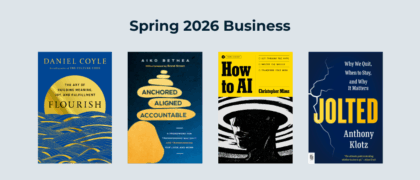On Wednesday, October 16, Penguin Random House colleagues attending the Frankfurt Book Fair were surprised with special author guest Yuval Noah Harari at the annual PRH reception that Nihar Malaviya, CEO of Penguin Random House, hosts each year in our German company’s fair booth. Harari’s most recent book NEXUS: A Brief History of Information Networks from the Stone Age to AI went on sale on September 10, in the U.S., UK, India, South Africa, Canada, Germany, Spain, Latin America, Brazil, Portugal, Australia and New Zealand, and has stayed on the bestseller charts around the world since then.

Nihar Malaviya (l), CEO, Penguin Random House, with surprise author guest, Yuval Noah Harari at the annual PRH reception.
Nihar kicked off the reception with a heartfelt welcome to the attendees, reflecting on how Penguin Random House’s significant footprint and presence at the Fair is an embodiment of PRH’s unique place in the industry as the only truly global publisher. He also emphasized the importance of the Fair not only as a hub for essential business but also as a valuable opportunity for colleagues to come together.
After the welcoming words, Nihar invited Harari on to the stage and introduced him to the audience by outlining the vast portfolio of his work which, in addition to NEXUS, includes SAPIENS: A Brief History of Humankind, HOMO DEUS: A Brief History of Tomorrow, 21 LESSONS FOR THE 21ST CENTURY, and the series Unstoppable Us.

NEXUS was published globally by Penguin Random House.
Nihar asked Harari about his experiences during his global book tour, and what motivated him to write NEXUS. The conversation also touched on the timely and complex question of AI and technology. When asked if he was an optimist or pessimist about AI’s role in the future, Harari responded with his trademark clarity, and a dash of humor, “I am a realist!” he said, acknowledging both the potential and the risks associated with technological advancements.

Harari’s books have sold 45 million copies in 65 languages.
Following the reception, Harari went on to speak at a keynote panel during the Fair’s opening night. The discussion, “NEXUS – Into the Future with a System Reboot?”, was an engaging exchange between Harari and Kohei Saito, a Japanese philosopher and critic of capitalism. The panel explored the themes of NEXUS and the future of human society in an age of rapid technological change.








